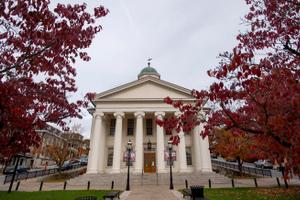This story was produced by the State College regional bureau of Spotlight PA, an independent, nonpartisan newsroom dedicated to investigative and public-service journalism for Pennsylvania. Sign up for our regional newsletter, Talk of the Town.
UPDATE: Several hours after this story was published, Centre County President Judge Pamela Ruest ordered that copies of the search warrants, with only names and identification of the victims redacted, be made publicly available.
Ruest did so in response to a motion by District Attorney Bernie Cantorna to dissolve the emergency ex parte preliminary injunction brought by Penn State.
STATE COLLEGE — At the request of Penn State, a Centre County judge has agreed to seal a case that includes search warrants involving crime victims who attend the university, shielding this information from the public and the press.
Sealing an entire file is “rare” and “should not happen absent extraordinary circumstances,” said Paula Knudsen Burke, the Pennsylvania attorney for the nonprofit Reporters Committee for Freedom of the Press.
Burke filed a motion Thursday on behalf of Spotlight PA, the Centre Daily Times, and WJAC-TV asking Centre County Court of Common Pleas to unseal the records and allow the news outlets to intervene in the matter.
“Precious little” is known about the matter, Burke said. The sealed case is captioned “search warrants involving crime victims who are students of the Pennsylvania State University.”
Penn State went to court on June 23 to ask for emergency relief in an ex parte nature, meaning that the other officials involved in the case — respondents Centre County District Attorney Bernie Cantorna and Prothonotary and Clerk of Courts Jeremy Breon — were not immediately told. The following day, President Judge Pamela Ruest issued an order to seal the entire case.
The Pennsylvania and U.S. Constitutions guarantee people the right to open courts, allowing them to both watch proceedings and read documents filed in court.
“All court records are open — family law records, divorce records, protection from abuse files, criminal cases,” Burke said. “Even if there is embarrassing information or violence or family drama contained within these filings, the public still has a right to see them, to make sure the justice system is operating effectively and without discriminatory bases.”
Burke added that if there is particularly private information contained in a court file, it’s the responsibility of the lawyers to redact that information, not seal the entire case.
Additionally, she said, under the Pennsylvania Rules of Criminal Procedure, there’s no role for a private actor like Penn State to try to shield search warrants. The university isn’t a law enforcement agency; nor is it a prosecutor.
“We don’t have secret courts in the United States,” Burke said. “Powerful institutions don’t have the right to go into court and seal records to try to shield unflattering information about their institution. It’s up to citizens and the media to be watchdogs and to push back and say, ‘These court records are constitutionally guaranteed to be open. We have the right to see them.’”
The matter has larger implications.
It’s important that the public sees the court operate the same for everyone, and that justice is applied equally and evenly, said Melissa Melewsky, media law counsel with the Pennsylvania NewsMedia Association (of which Spotlight PA is a member).
“It’s not just access in this case that’s important — it’s access in all cases,” she said. “If one case is sealed, it’s more than likely going to lead to seals in other cases. So you want to push back against the creep of secrecy in court filings and court proceedings because it’s a bit of a slippery slope.”
A hearing is scheduled for the Penn State case on July 26. Burke said media lawyers asked to be heard the same day, but a judge will have to rule on the request.
SUPPORT THIS JOURNALISM and help us reinvigorate local news in north-central Pennsylvania at spotlightpa.org/statecollege. Spotlight PA is funded by foundations and readers like you who are committed to accountability and public-service journalism that gets results.
